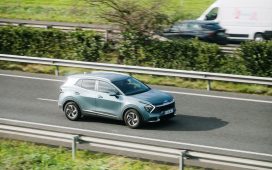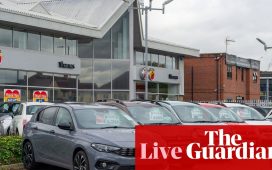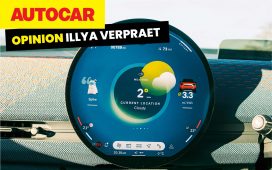When it comes to talking about up-and-coming Chinese electric vehicle manufacturers, BYD is perhaps the name on the tip of most people’s tongues.
The company has seen its brand awareness rise substantially through high-profile marketing campaigns, while it has also been a reliable presence at fleet events since it launched in the UK last year.
Growing interest in the brand reflects this. In 2023 it registered just 1,158 (657 in true fleet) vehicles for a market share of 0.6%: in the first six months of this year it almost trebled this to 2,904 for a 2% market share.
True fleet has been its biggest sales channel, taking 988 cars (50% up on 2023’s total), followed closely by Motability with 923 (up 243%).
But this is only the beginning for the brand, which was named Electric Car Breakthrough of the Year: Marque in this year’s Fleet News Awards, says Malcolm Fryer, head of European remarketing and UK fleet sales at BYD.
“We may be in start-up mode in the UK, but we’re not a start-up – we’re clear market leaders in China and the Chinese market is pretty much EU plus UK plus USA, less about 1-1.5 million units,” he adds.
“We’re not shy on ambition for the UK. Firstly, we’d like to capture 5% of the EV market, then we’d like to become market leaders in the electric market, and then we’d like to become market leaders in the total market.”
Much has already been said and written – including this excellent analysis from Fleet News group editor Stephen Briers – about how the Chinese electric vehicle brands will disrupt the global car market.
For BYD, steps it is taking to achieve this in the UK involves raising awareness of the brand, building a dealer network, expanding its range of products and targeting the fleet sector.
“The fleet sector is essential to us, absolutely vital,” says Fryer. “Around 80%-plus of EV registrations are through one of the fleet channels because they are being driven by favourable benefit-in-kind taxation treatment.
“And the other big driver I see in the industry is the ZEV mandate. That’s putting a lot of pressure in terms of supply into the industry, but it’s not necessarily matched by demand, certainly at the retail level, but is very attractive in the fleet channels.”
Strong fleet presence
BYD has also attended events such as Company Car in Action and Fleet and Mobility Live to allow fleet decision-makers to see and experience its vehicles for themselves. It has also ramped up its demonstrator fleet.
The manufacturer identified the importance of a strong dealer network in establishing a solid footprint in the UK.
It launched with four dealers. This has grown to around 40 now and will soon be close to 60, says Fryer.
“We know that some of the fleets held back on us because they were nervous about our capability to look after the cars once they’ve gone out into the market,” he adds.
“I totally get that, but we’re now getting to the point where we are providing that additional aftersales support and giving confidence in our network coverage to the larger fleets.”
BYD’s dealer network strategy is seeing them limit the number of investor partners to below 20 in the UK, strategically selecting them to cover specific geographic areas.
“We’ve got a number of dealers within our portfolio who are big providers and suppliers into the fleet industry,” says Fryer. “They’re geared up for it and understand the needs of the fleets and leasing companies in particular.
“We’ve got people like CWC in Exter, Lookers in in Sheffield and Middlesborough, but also in Northern Ireland under the Charles Hurst brand.
“We’ve also got Pendragon and the latest addition to join the ranks of BYD is Vertu: all strong players in the fleet sector.”
Growing fleet team
BYD’s UK fleet team is also growing. Fryer currently has three fleet sales managers, who cover different geographical areas and specialisms.
Jeannette Griggs is based in Newcastle and is responsible for all public sector and special vehicle sales, conversion, delivery and technical support; Marc Samuel is based in the Midlands and looks after channels such as private hire, public carriage office (PCO) business such as Uber, and daily rental suppliers; while Claudio De Freitas is based in London and looks after leasing companies predominantly.
“This gives us a nice spread across the key fleet channels that I see align well with BYD product,” says Fryer. “We’re just hiring another line of fleet sales executives currently, and they’ll be really getting into some of the larger corporates.”
BYD is also seeing an increasing number of company car drivers requesting their employers add the brand to their company car lists.
Fryer says this is partly down to the hard work and effort which has gone into raising the wider awareness of BYD, as well as a growing product line-up.
It currently offers three cars – Atto 3, Dolphin small hatchback and Seal compact executive. It also offers the ETP 3 light commercial vehicle in limited numbers.
“Someone told me last month our brand awareness had increased from 3% to 17% which is huge, and that was before the Euro 2024 championship which we were the e-mobility sponsor and partner of,” says Fryer.
“So if you hadn’t heard of BYD and you like football, you would have heard of us by the end of the tournament. That is going to really turbocharge our brand awareness.
“We see from other activities that we’ve done, such as partnering with the ITV primetime show Saturday Night Takeaway where we gave viewers the chance to in a car each week, there is always a spike in inquiries via Google and people coming to the BYD website.”
Expanding product range
BYD’s line-up will expand further in September, when the Seal U DM-i plug-in hybrid arrives.
The manufacturer brands the car, which will compete with the Ford Kuga and Kia Sportage in the D-segment SUV sector, as the Song in China, where it sells more than 50,000 units every month.
“We’ve done some analysis based on the driver behaviours in China and what we’ve learned is that two-thirds of the time the vehicle is in pure EV mode, with the remainder in hybrid mode,” says Fryer.
“I think this is a game changer in daily rental. It’s also a very attractive proposition for company car drivers that have difficulty making the full switch to BEV because it’s 8% BIK. If you compare that to a petrol or diesel vehicle, that’s a substantial saving.
“The electric market in passenger car in the UK is 16-17% in terms of the current take-up. Now we’ve got something that appeals to the other 80-odd percent and that’s a fantastic additional string to our bow.”









